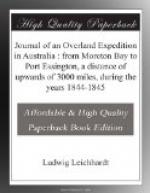were then on a high box-tree ridge, in view of a thick
scrub; we hobbled our horses, and covered ourselves
with our blankets; but the storm was so violent, that
we were thoroughly drenched. As no water-holes
were near us, we caught the water that ran from our
blankets; and, as we were unable to rekindle our fire,
which had been extinguished by the rain, we stretched
our blankets over some sticks to form a tent, and
notwithstanding our wet and hungry condition, our
heads sank wearily on the saddles—our usual
bush pillow—and we slept soundly till morning
dawned. We now succeeded in making a fire, so
that we had a pot of tea and a pigeon between us.
After this scanty breakfast, we continued our course
to the north-east. Brown thought himself lost,
got disheartened, grumbled and became exceedingly
annoying to me; but I could not help feeling for him,
as he complained of severe pain in his legs.
We now entered extensive Ironbark flats, which probably
belong to the valley of the Mackenzie. Giving
our position every consideration, I determined upon
returning to the mountains at which we had turned,
and took a north-west course. The country was
again most wretched, and at night we almost dropped
from our saddles with fatigue. Another pigeon
was divided between us, but our tea was gone.
Oppressed by hunger, I swallowed the bones and the
feet of the pigeon, to allay the cravings of my stomach.
A sleeping lizard with a blunt tail and knobby scales,
fell into our hands, and was of course roasted and
greedily eaten. Brown now complained of increased
pain in his feet, and lost all courage. “We
are lost, we are lost,” was all he could say.
All my words and assurances, all my telling him that
we might be starved for a day or two, but that we
should most certainly find our party again, could not
do more than appease his anxiety for a few moments.
The next morning, the 21st, we proceeded, but kept
a little more to the westward, and crossed a fine
openly timbered country; but all the creeks went either
to the east or to the north. At last, after a
ride of about four miles, Brown recognized the place
where we had breakfasted on the 19th, when all his
gloom and anxiety disappeared at once. I then
returned on my south-east course, and arrived at the
camp about one o’clock in the afternoon; my
long absence having caused the greatest anxiety amongst
my companions. I shall have to mention several
other instances of the wonderful quickness and accuracy
with which Brown as well as Charley were able to recognize
localities which they had previously seen. The
impressions on their retina seem to be naturally more
intense than on that of the European; and their recollections
are remarkably exact, even to the most minute details.
Trees peculiarly formed or grouped, broken branches,
slight clevations of the ground—in fact,
a hundred things, which we should remark only when
paying great attention to a place—seem to
form a kind of Daguerreotype impression on their minds,
every part of which is readily recollected.




